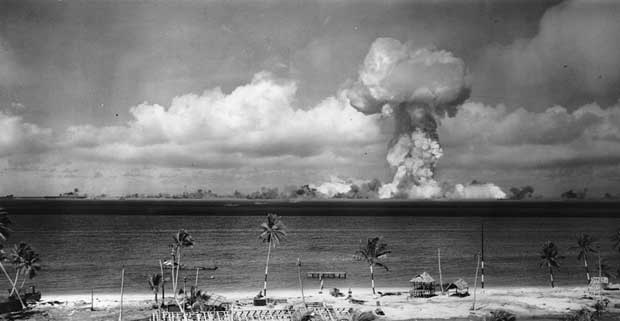06 Sep 2017 - {{hitsCtrl.values.hits}}

By · Faye Flam
(c) 2017, Bloomberg View ·
North Korea’s advancing nuclear weapons program isn’t the only news to unnerve arms-control experts this summer. A new survey has revealed that Americans are surprisingly willing to make a first nuclear strike -- and kill millions of civilians abroad.
The survey casts doubt on the power of what experts call the “nuclear taboo,” said Stanford University historian David Holloway, author of “Stalin and the Bomb.” The idea, or hope, behind the concept is that it’s not just luck that humans haven’t dropped any nuclear weapons for 70 years -- that there’s a stigma that makes the use of nuclear weapons unthinkable.
But many Americans say it’s quite thinkable. The taboo may be eroding, or it may never have been the protective barrier people thought it was.
The survey’s designers sketched out a hypothetical conflict with Iran -- a country without nuclear weapons. Around 60 percent of those polled said that if Iran provoked the U.S. with some non-nuclear aggression, they’d approve of blowing up 2 million Iranian civilians using nuclear weapons rather than sacrificing 20,000 American lives in a ground attack.
“That just means they haven’t thought about it,” said Brian Toon, a professor of atmospheric science at the University of Colorado. They think nuclear weapons are just big bombs that blow up lots of people, he said, without considering the way a nuclear conflict -- even a “small” one involving some 10 percent of the U.S. arsenal -- might poison millions of men, women and children. and change the climate enough to starve hundreds of millions.
Today, it’s not Iran but North Korea that’s the focus of concern -- with its continued testing of nuclear missiles despite Trump’s threat of “fire and fury.” Serious people are starting to consider the possibility of nuclear conflict. While the North is unlikely to be capable of sending nuclear missiles all the way to the U.S., at least for now, there are plenty of ways casualties could escalate. “There are nuclear reactors all over North Korea,” Toon said. So you might have Fukushima-type contamination all over the country.
Perhaps if people more clearly understood the destruction of human life that would result, the taboo would regain its power. In the early years of the Cold War, the power of nuclear weapons apparently surprised Daniel Ellsberg, a RAND Corp. analyst on loan to the Pentagon for the purpose of nuclear war planning.
“One day in the spring of 1961, soon after my 30th birthday, I was shown how our world would end,” he wrote in 2009. Ellsberg, who is famous for leaking the Pentagon Papers in 1971, has spent recent decades examining the potential for nuclear catastrophe. His latest book, “The Doomsday Machine: Confessions of a Nuclear War Planner,” will be released in December.
The end of the world was described in a highly classified document, Ellsberg recalled. While it didn’t necessarily spell extinction of the human race, it estimated a nuclear war would kill at least 600 million people -- or as Ellsberg put it, “a hundred Holocausts.”
Is there some logic to accepting 2 million deaths but not 600 million? Is there some number of holocausts that would be acceptable? Historian Holloway said that such mass killing would be considered unacceptable under the philosophical framework called just war theory - a set of criteria that political and military leaders have used to determine if a war is justifiable. Still, mass bombings during World War II made people familiar with the idea of targeting civilians. And the advent of nuclear weapons made it seem unavoidable.
To Americans, apparently, the morality of using nuclear weapons to kill civilians depends on time and place. In a paper describing this new survey, “Revisiting Hiroshima in Iran,” the authors write that most Americans approved of dropping nuclear weapons on Japan in 1945. But by 2015, most said the U.S. should not have used nuclear weapons or should have dropped them on unpopulated areas. The authors attribute this change of heart to Americans’ changing attitudes toward the Japanese.
It might be worth considering why experts have such a strong sense of the nuclear taboo -- one that goes beyond horror at sheer numbers of deaths an attack would cause.
A nuclear exchange might remain limited -- but then, it might not. Physicists chart the probability of nuclear war with what they call the Doomsday Clock, which has recently been edging toward midnight. If the U.S. launched a first strike against North Korea, experts say there’s no guarantee that China or Russia wouldn’t join in, either on purpose or by mistake. The actions of other countries are hard to predict in a state of confusion and fear. During the Cold War, several false alarms brought the U.S. and the Soviet Union within a heartbeat of launching massive attacks. Even as late as 1995, a science experiment sent off a false alarm and almost triggered an attack from Russia.
16 Nov 2024 2 hours ago
16 Nov 2024 2 hours ago
16 Nov 2024 3 hours ago
16 Nov 2024 3 hours ago
16 Nov 2024 4 hours ago